

Getting Better at Feeling to Feel Better (for the Long-Term) Last week Jane came into my office feeling paralyzed and confused.
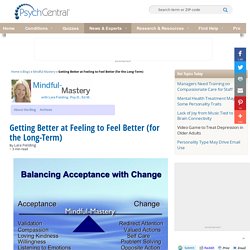
“When my anxiety starts up I try to use my skills to validate my emotions. But then my mind starts finding all the real things I have to feel anxious about! So how do I know when to listen to my emotions?” Jane’s question is important, because finding the needed balance between accepting and changing our emotions can be a very subtle, nuanced endeavor. Finding the Balance The skill of regulating emotions is balancing feeling better, with getting better at feeling. Feeling Better: Most of us get caught in our feel better auto-pilot habits, which reduce the short-term discomfort, but take us off track towards our long-term goals.
Too much emphasis on this side of the balance often leads to paradoxical backlash. Getting better at feeling. Without willingness: But too much emphasis on this side of the balance can get us caught in the spiral of intense, unhelpful secondary emotions. Holding Center: Balancing Acceptance with Change. Want to Feel Better? Start With Your Gut. Find Happiness by Embracing All of Your Emotions. Our culture places a high value on happiness—having the best job, house, the most friends, things in general.
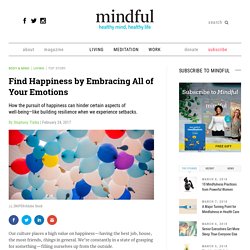
We’re constantly in a state of grasping for something—filling ourselves up from the outside. And it’s totally bumming us out. Feeling Separate When You’re Anxious: Two Mindfulness Practices to Reconnect. Emotion Regulation. Music Therapy. MBSR: 25 Mindfulness-Based Stress Reduction Exercises and Courses. Home » Mindfulness » MBSR: 25 Mindfulness-Based Stress Reduction Exercises and Courses “Reality is the leading cause of stress amongst those in touch with it.” – Jane Wagner If the quote above strikes a chord with you, congratulations – you are human!
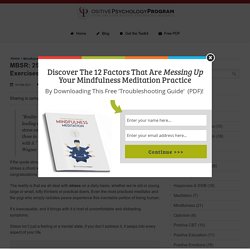
The reality is that we all deal with stress on a daily basis, whether we’re old or young, large or small, lofty thinkers or practical doers. Even the most practiced meditator and the yogi who simply radiates peace experience this inevitable portion of being human. It’s inescapable, and it brings with it a host of uncomfortable and distracting symptoms.
Stress isn’t just a feeling or a mental state; if you don’t address it, it seeps into every aspect of your life. Free Mindfulness Meditation Troubleshooting Guide (PDF) "Find Out What Is Preventing You And Your Clients From Meditating Effectively" To the point, easy to read and print (7 page PDF) Written by academics, 100% science-based Discover the 12 reasons why you don't meditate. A 10-Minute Meditation to Work with Difficult Emotions. Can you feel the heat? Life feels a little more intense these days: at home, work, out in the world. When life begins to feel more intense than normal, it’s important to remember to slow down, turn toward these bigger feelings, and see the bigger picture. Take each day at a time. Life is always in flux.
Every thought, feeling, and moment is quickly changing into the next. We never really know what is coming next and sometimes the best we can do is put one foot in front of the other and keep breathing through all of it. What I hear from most of my clients and students is that uncertainty is what creates the most difficulty. The more we can meet any difficulty with presence, compassion, and kindness, the easier we can move through it. Meditation trains you to be resilient. For example, the other week, a good friend was going through a lot of difficulty and loss.
Meditation trains you to be resilient. What Does Staying with Uncertainty Look Like? “I am here.” How Meditating Helps You with Difficult Emotions. How are you feeling?
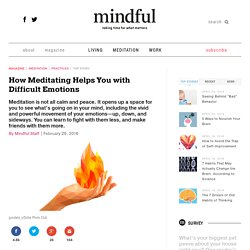
Meditation gives us a chance to entertain that question at a deeper level. It can give us the room to fully experience an emotion for what it is. Stop being so emotional! Lean in to Your Fears Using Mindfulness. Fear is primal.
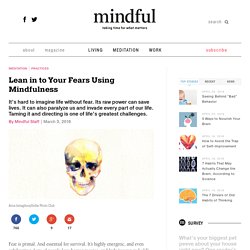
And essential for survival. It’s highly energetic, and even exhilarating. Lots of people love horror movies, and kids (young and old) get a huge kick out of scaring each other. But fear is no joke. It can be a highly aroused state that overtakes us in response to a perceived threat, causing us to either fight, flee, freeze, or faint. Cooling the Raging Fires of Anger.
Recently I found myself in an intensive care unit at the bedside of a loved one.
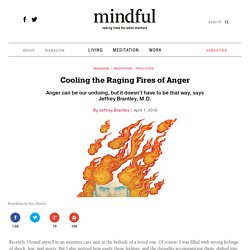
Of course, I was filled with strong feelings of shock, fear, and worry. But I also noticed how easily those feelings, and the thoughts accompanying them, shifted into anger. It projected itself onto anything in my field of awareness, from the staff, to the machines, to myself. I was even angry at the person in front of me who was in need of critical care.
Fortunately my loved one survived the health crisis, and in the days that followed, my experience in the ICU caused me to reflect once again on the nature of anger—to become more keenly aware of anger in myself and in others. Anger causes so much suffering in our personal relationships and in our society.